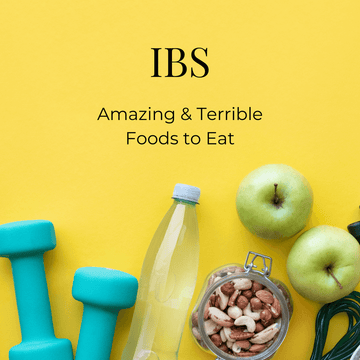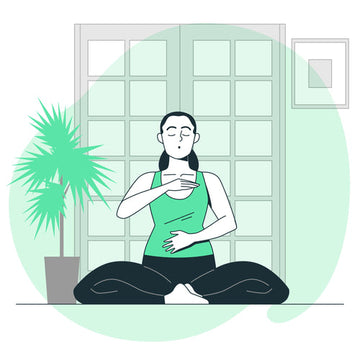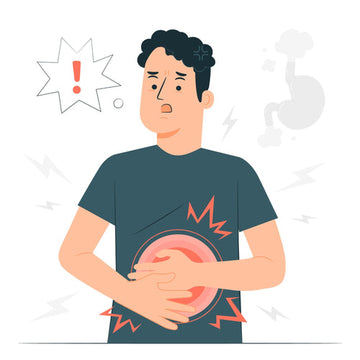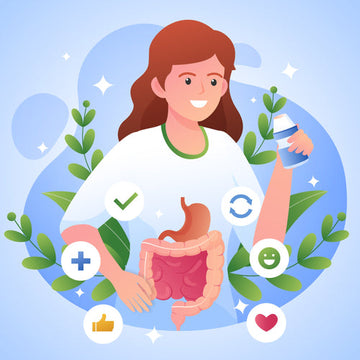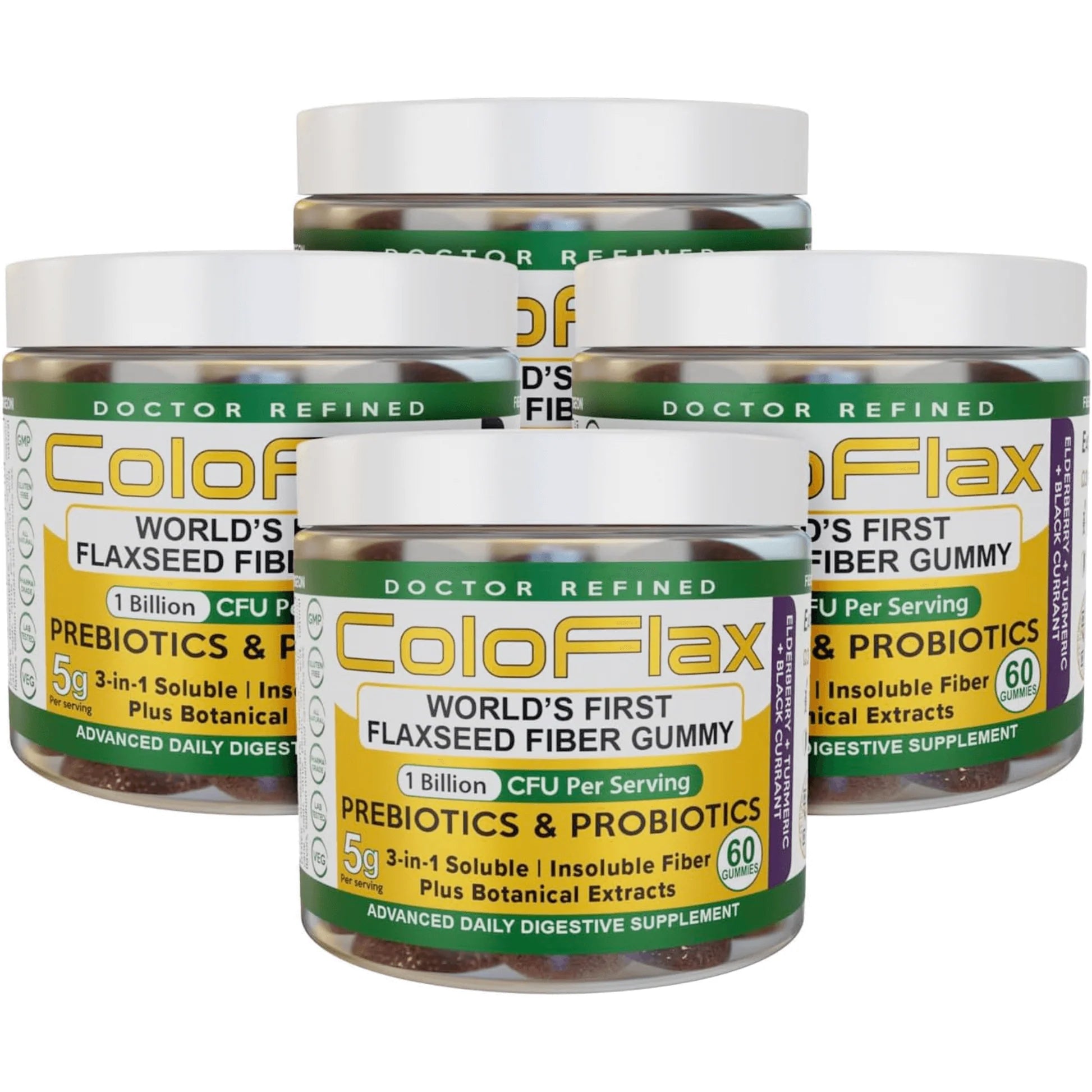There are an estimated 25 to 45 million sufferers of irritable bowel syndrome (IBS) in the United States. It’s a condition that affects adults and children; men and women. Many non-sufferers dismiss the condition as a minor discomfort, something that causes gas, bloating, and a few embarrassing moments.(1)
But it can actually be a very serious condition that leaves a significant mark on the lives of sufferers. People with IBS are more likely to have surgery, for instance, with cholecystectomy and hysterectomy surgeries being 2x and 3x more likely. It also affects social lives, relationships, and self-confidence.(2)
There is no cure for IBS, but it can be managed with dietary changes. In the following guide, we’ll take a closer look at those changes, highlighting the foods that you should be eating and the ones you should avoid if you have IBS.(3)
The Worst Foods for IBS
The “worst foods for IBS” are so named because they are more likely to trigger flare-ups. It’s best to avoid these foods if you want to keep your IBS symptoms at bay.
Here are the most common foods that cause IBS issues:
Dairy

Dairy is one of the biggest triggers for people with IBS.
People with IBS tend to have very low levels of lactase, an enzyme that breaks down lactose, a type of sugar found in dairy products. Adequate amounts of lactase prevent a build-up of gas that can lead to flatulence, bloating, and general discomfort.
This sugar is also an issue for people with lactose intolerance, a condition that can present with similar symptoms to IBS.
Not everyone with IBS has issues with lactose, but if you find that your symptoms get worse after consuming cheese, butter, or milk, you should refrain from these foodstuffs. If you can’t bear to be without, look for lactose-free alternatives.
High-Fructose Foods

Foods that contain high levels of fructose may cause issues for people with IBS. These include pears, apples, and watermelons. Fruit is generally very good for you. It is packed with fiber, antioxidants, and other beneficial compounds, but it’s best to avoid these specific fruits and consume low-fructose alternatives, including citrus fruits, berries, and grapes.
Cruciferous Vegetables

Cruciferous vegetables are some of the healthiest foods that you can eat. They are high in protein and high in antioxidants. They have also been linked with a huge number of health benefits. But none of that is helpful if you have IBS, as these foods can cause flare-ups.
The problem is that they are high in sulfur, which can lead to a build-up of gas.
Cruciferous vegetables include:
- Cabbage
- Broccoli
- Brussel Sprouts
You may notice that most of these foods appear on lists of the healthiest foods that you can eat, including our own list of the healthiest vegetables. But don’t worry, as there are many alternatives that provide just as many nutrients and won’t interfere with your IBS symptoms.
Keep reading to learn more.
Beans

The effects of beans on the digestive system are well known. So much so, in fact, that they have worked their way into a couple of classic children’s rhymes:
Beans, beans, they're good for your heart. The more you eat, the more you fart. The more you fart, the more you eat. The more you sit on the toilet seat!
Beans, beans, the musical fruit. The more you eat, the more you toot. The more you toot, the better you feel. So let's have beans for every meal!
They are packed with protein and fiber and are a good source of both if you can eat them. However, if you have IBS then you may want to stay clear. Beans can cause bloating and gas and make your life very difficult if you have IBS and other digestive disorders.
Legumes

Legumes cause many of the same issues as beans. They also have the same benefits, so they’re good to eat if you don’t have IBS but should be avoided if you do. Types of legumes include:
- Lentils
- Broad beans
- Chickpeas
- Soybeans
- Peas
- Lima beans
It should be noted that peanuts are also classed as legumes but are generally considered to be acceptable for IBS sufferers. In fact, peanuts are a great way to get a regular dose of healthy fats and protein without triggering your IBS.
Prunes

Prunes are the go-to food for many constipation sufferers. They are natural, gut-friendly, and incredibly effective, as noted in our article on natural constipation cures. But they’re not so friendly if you have IBS.
Prunes are high in sorbitol, a sugar that draws more water into the gut and thus helps with the passage of stools. It can cause gas and bloating. So, they’re good for keeping you regular or beating constipation but are best left alone if you have digestive issues.
Sugar Alcohols

Many of the sugar substitutes found in chewing gum and sugar-free candy can cause similar issues to sorbitol. These include xylitol, maltitol, and isomalt. These compounds are the reason that many sugar-free candies include a warning that overconsumption can have a laxative effect.
Caffeine

High quantities of caffeine may trigger IBS symptoms. As with many of the foods in this list, it’s okay to enjoy them on occasion and some people will suffer more issues than others, but if you’ve avoided all of the foods above and your symptoms are still there, try abstaining from tea, coffee, energy drinks, soda, and chocolate.
The Best Foods for IBS
One of the biggest challenges of IBS is that many foods that are “bad” for those with IBS are good in general. We highlighted a few of these above and no doubt crossed many superfoods off your list in the process.
But that doesn’t mean you’re reduced to eating low-quality, highly-processed foods. There are still many healthy foods you can eat. In fact, you can have a broad and varied diet with IBS.
Here are some of the foods to consider eating:
Lean Meats

Lean meat like pork, chicken, turkey, and certain cuts of beef rarely trigger digestive issues for people with IBS. Some dieticians recommend eating grass-fed meats and choosing higher quality options when possible, but the difference is likely to be negligible providing you’re not eating something that’s processed or loaded with hormones.
Eggs

Eggs are a great source of protein and essential nutrients. They are usually easy to digest, as well.
But it’s not all good news for lovers of scrambled and soft-boiled eggs. Some can suffer issues when consuming eggs, and you might be one of them.
So, if you cut out all of the “bad” foods listed above and are still having issues, skip eggs as well.
Fatty Fish

Omega-3 fatty acid has been linked with all kinds of health benefits, so you’ll be glad to know that it doesn’t usually cause issues for those with IBS.
Consume a few servings of fatty fish a week to get your fill of this nutrient. Mackerel, herring, sardines, and trout are some of the best sources. Not only are they rich in omega-3, but they are a good source of protein too.
Low-Fructose Fruit

High-fructose fruit might cause issues, but there are many types of fruits that will not. Berries are a great example (blueberries, strawberries). They are sweet, tart, and loaded with antioxidant compounds, so they are well worth adding to your diet.
Kiwi fruit is another worthwhile addition. It’s packed with vitamin C and fiber and may help to support your digestive, immune, and cardiovascular health. Other IBS-friendly fruits include:
- Limes
- Orange
- Lemons
- Cantaloupe Melon
- Pineapple
- Grapes
- Bananas
Nuts and Seeds

If you’re a vegan or vegetarian and can’t get your protein from lean meat or your omega-3 from fish, grab a handful of nuts or seeds instead. Flaxseed is a prime example, provided you don’t consume too much of them. They are high in healthy fats and protein, as well as a number of minerals.
Almonds, macadamia nuts, Brazil nuts, and pecans are other great examples. Bear in mind that nuts are very calorific, so they should be consumed in moderation.
Water

It’s not strictly a “food”, but water forms an important part of any IBS-friendly diet and any healthy diet in general. Drink plenty of water throughout the day to ensure your body has what it needs to operate optimally and your gut remains strong and healthy.
You’ve probably heard that you need a specific amount of water, with “8 glasses” usually being the amount quoted. The truth is that your water needs will depend on everything from how often you work out to where you live and how much fresh food you eat.
Don’t get bogged down by numbers and specifics. Just drink water with a meal and when you’re thirsty or sense the early signs of dehydration.
What is the FODMAP Diet?

If you have IBS, learn about FODMAP, as it could make your life easier.
FODMAP stands for fermentable oligosaccharides, disaccharides, monosaccharides and polyols. It references short-chain carbs that are difficult to digest and can cause problems with IBS.
You might be able to keep your IBS in check with a low-FODMAP diet. If you’ve spoken with your doctor about your IBS, they may have already recommended such a diet.
Low-FODMAP foods include most of the ones we have listed as the “best IBS foods” above. Generally speaking, they are lactose-free milk, some milk alternatives, certain grains, lean proteins, low-fructose fruits, and vegetables that are easy to digest.
If you’re still struggling to get a grip on this diet and keep your IBS symptoms at bay, speak with your physician or a registered dietitian.
What Causes IBS?
Certain foods are known to trigger the symptoms of IBS, but no one knows for sure what causes it. Experts have speculated that it could be caused by a range of different things, including problems with muscles in the digestive tract, as well as hypersensitivity in the nerves.
It’s probably not what you wanted to hear, but you’ll start to notice when the flare-ups occur and this can help you to pinpoint the cause. Once you learn the issue, you just need to make some simple diet or lifestyle changes and you should see some improvements.
Be sure to speak with your physician if you need more help or guidance regarding IBS.
Summary: Good and Bad IBS Foods
As you can see, there are many foods to avoid when you have IBS, but there are also many that you can eat. It’s also important to eat plenty of fiber and support your digestive microbiome with probiotics and prebiotics.
Supplements may help too. Check out our ColoFlax flaxseed fiber gummy for a supplement that combines insoluble and soluble fiber with prebiotics, probiotics, omega-3 fatty acids, and antioxidants.

